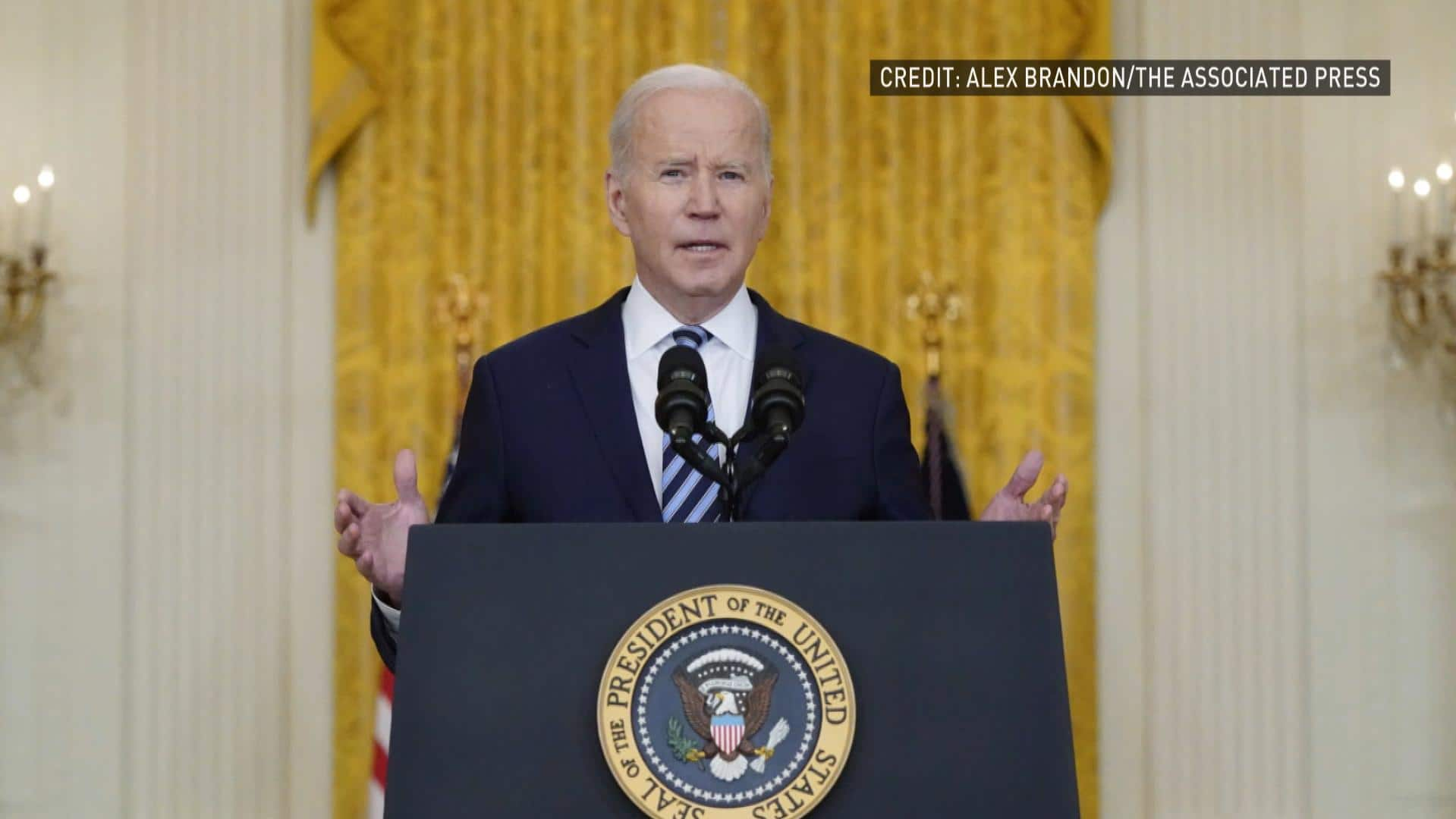At 5 a.m. Thursday, Ukrainian Member of Parliament Ivanna Klympush-Tsintsadze was jolted out of bed by the impact of Russian bombs detonating near her apartment in downtown Kyiv.
By 7:30 a.m., she and other MPs had gathered in the parliament to pass legislation declaring martial law in the country. And by 9 a.m., she says each MP had been given their own assault rifle to help defend the country's parliament, if it comes to that.
She told CBC News she believes it will.
"I think he actually has in mind to attack Kyiv tonight (Thursday)," Klympush-Tsintsadze said of Russian President Vladmir Putin.
"They want to install a puppet government here and they want to try to steal our statehood," she said.
Ukraine under attack
On Thursday, U.S. Secretary of State Antony Blinken said that he is "convinced" Moscow is going to try to overthrow the Ukrainian government. Blinken's comments came during a taped national TV interview, in which he was asked about Putin's ambitions.
"You don't need intelligence to tell you that that's exactly what President Putin wants. He has made clear he'd like to reconstitute the Soviet Empire, short of that he'd like to reassert a sphere of influence around the neighbouring countries that were once part of the Soviet bloc," said Blinken.
In an angry speech early Thursday morning prior to launching an invasion of Ukraine, Putin detailed a long list of grievances and vowed to protect Russian-speaking Ukrainians who he claims — without evidence — face "humiliation" and "genocide" perpetuated by what he called the "Kiev regime."
"And for this we will strive for the demilitarization and denazification of Ukraine," Putin said.
Putin has repeatedly said the 2014 Maidan uprising that ousted Ukraine's Russian-leaning ruler was a "coup" orchestrated by the United States.
WATCH | Here's what it was like in Kyiv Thursday:
Beginning early Thursday, Russian troops moved across the border at several locations, including toward Kharkiv to the east and Kherson in the south, near the Russian-occupied Crimean peninsula. Additionally, Russian troops crossed the border north of Kyiv from Belarus.
Russian ships in the Black Sea also fired long-range missiles at targets across the eastern part of the country.
There was also a Russian paratrooper attack on Antonov airport, which is less than 30 kilometres from the capital, Kyiv.
GALLERY | Civilians hide, flee in Ukraine as cities fall under attack by Russia:
Video posted on social media showed multiple Russian helicopters strafing the airport, with missiles and weapons fire. Ukraine's military acknowledges the facility was seized by Russian paratroopers earlier in the day and that an intense firefight was unable to push out the invading forces.
Unnamed American defence officials quoted by Reuters and other news agencies have said they believe the Russian plan is to move into Kyiv as quickly as possible to "decapitate" Ukraine's leadership.
By the end of day one of the attack, 137 soldiers and civilians had died, Ukraine President Volodymyr Zelensky said Thursday night.
'I'd be very worried'
"I'd be very worried," said Dmitri Alperovitch of Silverado Policy Accelerators, a Washington, D.C.,-based think tank.
"The problem is the language Vladimir Putin is using is really outrageous — he's calling them (Ukrainians) Nazis. And of course, the Russians have a long history of doing horrible things to anyone they believe are Nazis, including executions."

Klympush-Tsintsadze, 47, is a member of Ukraine's European Solidarity Party and a long-time proponent of Ukraine's integration with Europe, even while sitting in opposition to Zelenksy.
She said she hasn't picked up a firearm in 30 years, since she was a student in the former Soviet Union when firearms training was mandatory.
But she plans to keep the weapon close in the dire hours that lay ahead.
"Ukrainians would never respect or accept a (Russian) puppet government but that doesn't mean it changes Putin's plans," she said.
Alleged 'kill list'
American intelligence reports claim Russian security services have come up with an alleged "kill list" of senior Ukrainian officials who are either to be eliminated or sent to camps, should Russia's invasion succeed in toppling the Zelensky government.
The Kremlin has denied any such list exists.
Zelensky, who has spoken publicly on several occasions throughout the day, has said he and his family are committed to remaining in the capital Kyiv, even as Russian forces close in.
"[The] enemy has marked me down as the No. 1 target," Zelensky warned in a video message. "My family is the No. 2 target. They want to destroy Ukraine politically by destroying the head of state."
"I will stay in the capital. My family is also in Ukraine."
"I think that's very brave," said Alperovitch, adding Russia could be looking to eliminate anyone who could potentially mount opposition to a Russian-installed regime.
Klympush-Tsintsadze wouldn't say whether Ukraine should move its government to the western part of the country, where Russian forces had yet to penetrate.
"I cannot tell you," she said, suggesting it would be unwise to talk about any future plans before adding, "I think it's important that the government and authorities are staying in Kyiv."
'We are losing time'
In the meantime, she expressed frustration that it took more than 13 hours after the first bombs fell for the United States to introduce a package of sanctions against Russia.
WATCH | U.S. President Joe Bidens defends sanctions against Russia:

And while the measures targeted big Russian banks, crucially they did not disconnect Russia from the international financial transaction system, known as SWIFT, which the Ukrainian government has been demanding.
Germany's chancellor Olaf Scholz suggested it could happen sometime in the future, but Klympush-Tsintsadze says she fears Ukraine may not have much time left.
"I think we are losing time to stop the biggest criminal in the world that exists today," she said.

















